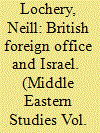| Srl | Item |
| 1 |
ID:
097785


|
|
|
|
|
| Publication |
2010.
|
| Summary/Abstract |
The article examines the complex relationship between the British Foreign Office and Israel. It argues that in 1976 was a year of transformation in the relationship as the Foreign Office shifted towards a more critical approach towards Israel following the resignation of the British Prime Minister Harold Wilson. It makes use of newly available documentary sources from the National Archives in London, which illustrate how the Foreign Office used the resignation of the widely perceived pro-Israel Wilson, and the arrival in power of James Callaghan, to quietly shift British policy towards the Arab-Israeli conflict to fall more into line with the policies of Britain's European Partners.
|
|
|
|
|
|
|
|
|
|
|
|
|
|
|
|
| 2 |
ID:
176169


|
|
|
|
|
| Summary/Abstract |
The history of modern British foreign policy largely devolves from an exclusively male perspective. In many respects, this was natural and appropriate because, until the 1940s, only men held senior positions in the Diplomatic Service. During the early twentieth century, attempts to change the “Foreign Office mind” to promote a greater acceptance of the role of women in the conduct and formulation of British diplomacy remained largely resisted. However, when examining the careers of the other group of women who worked at the Foreign Office, the clerical staff, the vast ranks of filing clerks, and shorthand typists, a very different view of this bastion of male conservatism emerges. With prosopography and on-line genealogy resources, this analysis traces a large cross-section of these women and analyses their life patterns and working experiences. It reveals that many of these women enjoyed quite a flexible working experience, with plenty of opportunities for career advancement, with some even transferring from the clerical classes to the Consular Service. This exegesis represents the first attempt to use prosoprographic techniques in the study of British foreign policy and suggests other ways to expand the present study and other similar projects undertaken to examine other government departments concerned with foreign affairs.
|
|
|
|
|
|
|
|
|
|
|
|
|
|
|
|